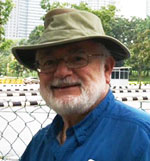Elizabeth Rosner, Survivor Café, The Legacy of Trauma [and the] Labyrinth of Memory (Berkeley: Counterpoint, 2017) 270 pages, $26
© Oliver B. Pollak

RICHMOND, California — Elizabeth Rosner comes to trauma study under unique personal circumstances. Her father, Carl Rosner originally of Hamburg, was freed from Buchenwald concentration camp at the age of 15 in 1945 by the United States Army. He visited Buchenwald four times, once in the 1970s, in 1983, 1995 and 2015. The last three times he took his daughter, the author. She was in her early 20s the first time, and had just attended the inaugural American Gathering of Jewish Holocaust Survivors and Their Descendants in Washington, D.C.
Rosner’s two earlier books were novels. This non-fiction work has been in preparation her entire life. It is about the transmittal of trauma from the victim to the second generation, a phenomenon that has been called trans-generational epigenetic inheritance, or inter-generational transmission of trauma. Rosner’s mother hid during the war and does not count herself a survivor.
The Holocaust set unprecedented levels for genocide, man’s inhumanity to man The prosecution of crimes against humanity started with the Nuremberg Trials, but did not stop recurrence. We ‘remember Cambodia, Darfur, Balkans, Syria, Rwanda, Somali, and Rohingya. And even before the Holocaust, there was the slaughter of Armenians. These reveal the insane depths of ethnic cleansing, of civil wars against internal differing religious and ethnic populations. The 20th and 21st century is filled with the recidivism of mindlessness and intolerance.
My maternal grandfather survived Theresienstadt, my paternal grandmother did not. My parents who escaped Austria and Germany in the late 1930s shared little of their experiences. Mother arrived in England in 1939, at the age of 18. It visibly pained her to talk about it. She shook when she heard German in a southern California supermarket. Mother lived to 95. It came as a shock in 1959 when standing with my parents in federal court becoming American citizens to hear my father answer “Yes” to the judge’s question if he had ever been married before. He had married a gentile in Vienna. We never talked about it. Talking might inflict more pain. My memories are different than my younger sister. We both bear middle names of our Austrian paternal grandparents.
My father reserved his worst curses for Germans. Memories and distrust colored their lives. My parents boycotted German products for two decades, but not food. In 1970 they went to Germany to pick up a Volkswagen in Wolfsburg and brought it to me in London.
The monthly and quarterly retirement pensions from Germany and Austria were ghostly reminders. The second and third generation, children and grandchildren, are spokespersons of inherited memory.
First generation victims include those who died, those who disappeared, those who survived, those who fled, the displaced person, the refugee. This trauma spills over to the second and third generation. Truth, reconciliation, and healing replaces the spiral of revenge, retribution and punishing perpetrators.
The author and her father sat down in Buchenwald’s pop up Survivor Café to talk with extra-ordinary second generation Germans wanting to honor the survivors and confront their national heritage. Reunions of survivors, invitations from cities like Hannover and Vienna, to former Jewish residents to visit and be honored at street namings, and the installation of “stumbling stones” are good will stratagems. Eslohe in 2018 celebrates the 100th anniversary of the Eslohe Footballer Club, founded by the Jewish brothers Julius and Robert Goldschmidt.
Slavery in Egypt, the American South and the Holocaust will be remembered in the chain of memory, the Passover Haggadah, liberation music, Holocaust museums, special prayers for the Six Million, and Yom Hashoah.
Survivor Cafe can lead to action. On Christmas Day 2017 my older cousin showed me a letter from our maternal grandfather, written on August 16, 1945 from Terezin. In early January I contacted Yad Vashem for any records they had on my grandparents. By mid-January they emailed me 35 documents on Felix Bachmann and Agnes Pollak. Survival compels bearing witness. We honor the past by preserving collective and individual memory and rethinking how to honor past and future generations. We are here because they survived. This book assists in understanding the complex trauma experienced by the 2nd and 3rd generation. Trauma meet Mitzvah.
*
Pollak, a professor emeritus of history at the University of Nebraska at Omaha, is a freelance writer now based in Richmond, California.